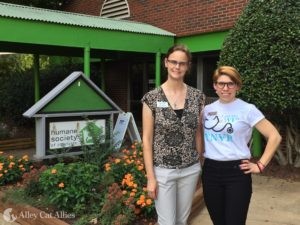Some residents of Charlotte, North Carolina, and surrounding Mecklenburg County call the municipal 311 customer service number about community cats, expecting to get referred to animal control. But as long as the situation isn’t an emergency, they’ll instead speak with Leah Massey, the first-ever community cat coordinator at the Humane Society of Charlotte (HSC). She’ll talk about Trap-Neuter-Return (TNR) and caregiving tips if callers want to help the cats, or share ideas for humane deterrents if they’re concerned about cats on their property.

Alley Cat Allies Associate Director of Community Engagement and Events Brianna Lovell (right) visits with the Humane Society of Charlotte Community Cat Coordinator Leah Massey.
This is all part of the Humane Society of Charlotte’s TNR program, which started about a year ago in partnership with municipal Charlotte-Mecklenburg Animal Care and Control. HSC had been performing low-cost spay and neuter surgeries for community cats brought in by the public for a few years, but was not actively doing TNR until it hired Massey. She had the organization join the Alley Cat Allies Feral Friends Network and got to work trapping.
Alley Cat Allies visited HSC at the end of September to learn more about its Community Cats Project. Our staff members were excited about its commitment to help community cats and bolster TNR in Charlotte.
The Charlotte community is generally embracing TNR, but the approach is still new to some people, says Massey.
“People come to us not knowing that this program does exist, that something can be done for these cats,” she says.
From January through September 2018, Massey carried out TNR for 521 cats, and the shelter facilitated TNR by spaying and neutering nearly 900 other community cats brought in by the public. The shelter provides a spay or neuter surgery, eartip, and rabies vaccination for $20. HSC loans out traps for the public, so Massey educates residents about doing TNR on their own. However, if the residents are older, unhappy about the cats in the first place, or lack other resources, she’ll do it.
The Humane Society of Charlotte had been partnering with Charlotte-Mecklenburg Animal Care and Control for five years to decrease the municipal shelter’s cat intake (it was 4,047 last year) and increase the 66 percent live release rate. The municipal shelter had already started a kitten nursery, and the organizations decided TNR was the next step.
As the community cats program grows, Massey hopes to strategically target TNR in areas with large cat populations. She is looking for volunteers who can help trap and transport cats in their neighborhoods. The Humane Society of Charlotte is also working to change the city’s community cat ordinance, which has licensing requirements and defines someone as an “owner” if they feed animals for more than 14 days in a row. This would put unfair responsibilities on community cat caregivers.
“We’re still in the beginning phases of how to best make [the community cat program] grow here in Charlotte,” says Massey. “We’re trying to get people to realize there’s not enough space at the shelter for them. If a cat’s outside, it doesn’t mean it’s living its worst life. Starting the conversation has kind of been the big thing.”

